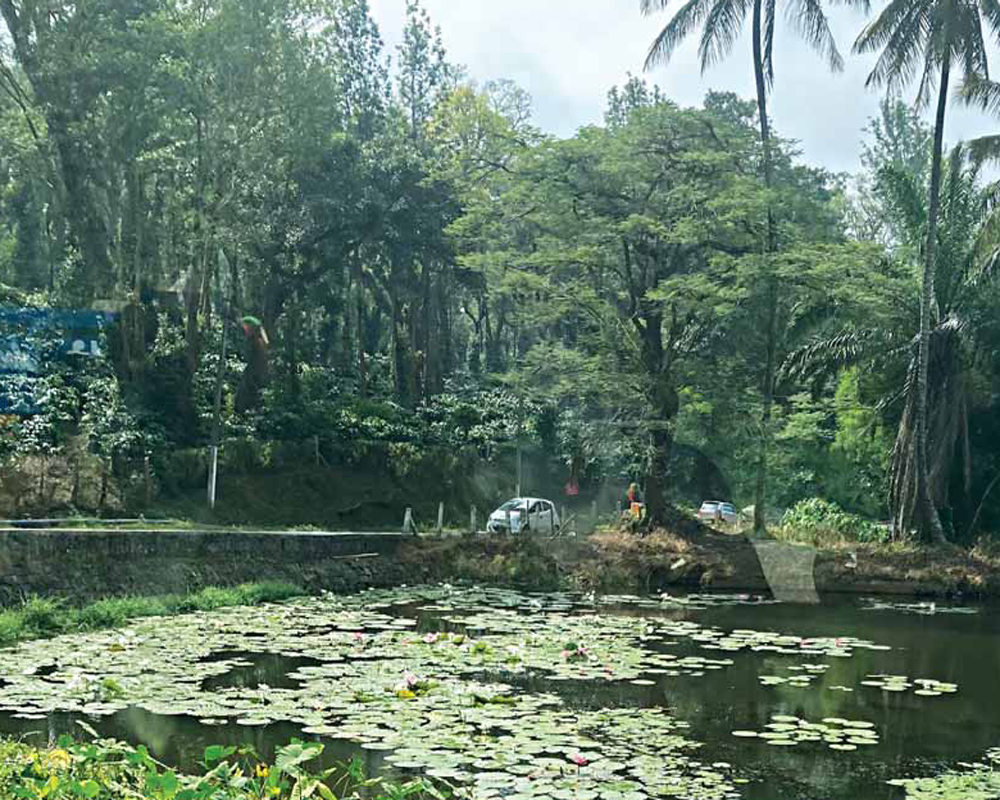
Coorg’s enchanting landscapes, explore it’s fascinating cultural heritage, and witnesses its evolving agricultural narrative, writes GYANESHWAR DAYAL
As I packed my bags in Delhi, the Air Quality Index (AQI) read a staggering 430. The smog had blanketed the city, the air felt heavy, my eyes burned, and even breathing felt like an effort. Touching down at Kempegowda International Airport in Bengaluru brought instant relief—the air was breathable. Although the temperature matched Delhi’s, the journey to Coorg brought with it a refreshing change. The five-hour drive transitioned from rocky terrains to lush greenery, offering glimpses of fascinating sights, including the iconic Gabbar Singh’s den from Sholay. An elephant family awaited us roadside, and a snake crossed our path, reminding us of the natural harmony where every creature has its place.
Night had fallen by the time we reached our destination, a 140-year-old British bungalow—Taneerhulla in Ama Coffee Trail, now a Tata property. As we settled in, the Delhi smog seemed like a distant memory. The next morning brought a mesmerising view; Coorg’s foggy landscape greeted us, and the AQI had plummeted to a serene 43. Breathing deeply, I wished I could carry this purity back to Delhi.
Nestled in Karnataka’s Western Ghats, Coorg or Kodagu, as locals call it, boasts a rich history shaped by its spices and natural bounty. This picturesque region, home to the Kodavas, has been a cultural and trading hub since ancient times. Kodavas are known for their martial traditions, unique customs, and a deep connection to nature. Over centuries, South Indian dynasties like the Cholas and Hoysalas left their mark here through temples and forts, which narrate tales of its past.
In the 15th and 16th centuries, Coorg’s spice wealth drew global attention. While Vasco da Gama’s 1498 voyage opened India to the Portuguese, the British annexation in 1834 forever altered Coorg’s landscape. Recognising its fertile potential, the British introduced commercial coffee cultivation. Today, Coorg thrives as one of India’s premier coffee-producing regions, renowned for its Arabica and Robusta beans. Plantation tours reveal the journey of coffee from farm to cup, offering visitors both knowledge and stunning views of misty hillsides.
The Western Ghats, a UNESCO World Heritage Site, play a crucial role in Coorg’s ecosystem. Their dense forests, cascading waterfalls, and biodiversity make Coorg a nature lover’s paradise. From sandalwood to teak and wildlife like tigers and elephants, the Ghats teem with life. They also sustain the region’s agriculture, which is evolving with a new player: avocados.
Coorg’s journey from coffee to avocados is nothing short of revolutionary. Westfalia Fruit, a global leader in avocado production, has identified Coorg’s tropical climate as ideal for cultivating Hass avocados. Partnering with local farmers, Westfalia aims to diversify income sources while maintaining sustainable practices. Their nursery supplies premium rootstock, and initiatives like Avocado Ki Paathshaala, led by celebrity chef Sanjeev Kapoor, are educating Indian consumers on the fruit’s health benefits.
Avocados have already become a global superfood, and Coorg is poised to contribute significantly to this market. From guacamole to avocado toast, its versatility ensures a place in both local and international kitchens. For farmers, this crop promises to yield four to five times the income of coffee, heralding a brighter future.
Coorg’s unique blend of ancient traditions and modern innovation makes it a standout destination. Tourists can explore its heritage through colonial bungalows, temples, and forts while savouring its natural beauty. Must-visit spots include Abbey Falls, Dubare Elephant Camp, and Talakaveri, where the Kaveri River originates. As eco-tourism flourishes, activities like trekking and birdwatching have gained popularity.
As my time in Coorg ended, I couldn’t help but reflect on its charm. The clean air, lush landscapes, and aromatic spices offered a stark contrast to Delhi’s smog-filled reality. Before leaving, I gathered a treasure trove of spices, coffee, and, of course, avocados. Coorg isn’t just a place you visit, it’s a place that stays with you. The memories of its pure air and serene beauty will keep calling me back, sooner rather than later.
source: http://www.dailypioneer.com / The Pioneer / Home> Exotica / by Gyaneshwar Dayal / December 19th, 2024

